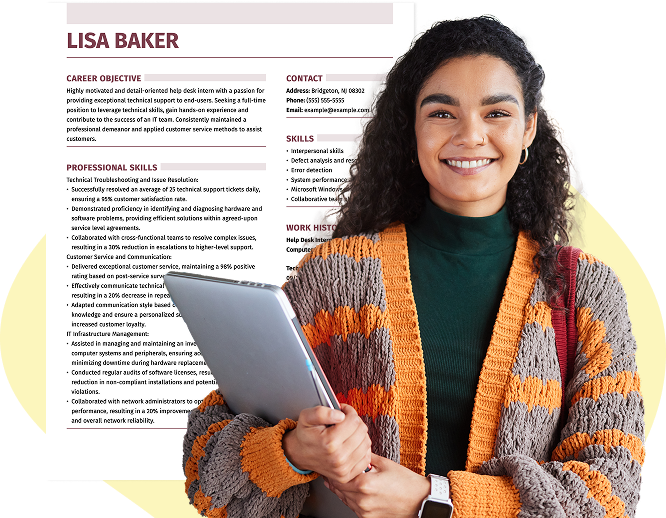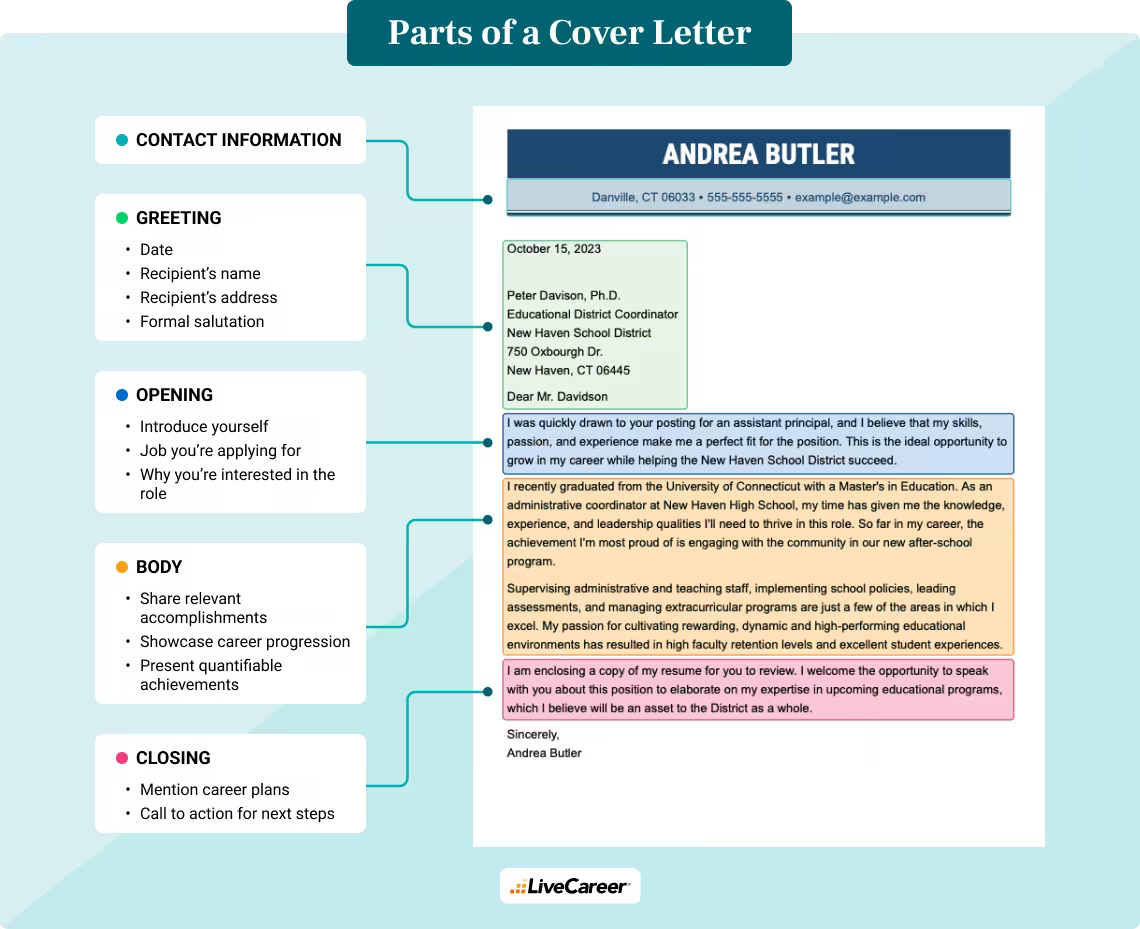How to Write an Internship Cover Letter & Templates
Here, you’ll learn how to write a cover letter for an internship that will help you land your dream opportunity. Plus, there are 13 free internship cover letter templates and examples to make it easier.
What Is a Cover Letter for an Internship?
A cover letter is a document used to apply for internships, volunteer positions, jobs, or academic opportunities. It’s an opportunity to expand on your internship resume and highlight your skills and relevant experience to a potential employer.
Cover letters for internships show that you have the passion, interest and communication skills to earn the role.
Check out this cover letter breakdown showing all the parts of an internship cover letter:
A cover letter’s format is the same as a standard business letter. It should stick to one page of 250 to 400 words and include:
- Your contact information.
- The employer’s address.
- A greeting.
- Three-to-four body paragraphs.
- A closing paragraph.
- A signature.
Why Cover Letters for Internships Matter
A cover letter is the perfect tool to increase your chances of winning an internship. It shows your attention to detail and allows you to connect with the person making the intern hiring decision.
Submitting an internship cover letter can help you impress by:
- Serving as proof of your communication and writing skills.
- Showcasing your enthusiasm and interest.
- Allowing space to share your career goals.
- Highlighting relevant skills, academic achievements and experience.
- Demonstrating your cultural fit to the company or industry.
- Expressing your personality and background.
Omitting a cover letter with your application may put you at a disadvantage. So, if you’re serious about being the person chosen for an internship, submit a cover letter.
If this is your first time writing a cover letter and you want extra help, consider using our Cover Letter Generator.
It’s like having an expert look over your shoulder to guide you step-by-step. Plus, it has a selection of expert-written content suggestions you can select from, add to your letter, and personalize!
How to Write a Cover Letter for an Internship
Review the post or ad before writing your internship cover letter.
There may be special instructions or a writing prompt for what to discuss in your cover letter. Read it very carefully.
Even if there are no special instructions, you should pay close attention to the skills, experience, and qualities they’re looking for in their ideal candidate.
Then, you’re ready to write your intern cover letter!
Cover letter writing follows six basic steps:
Step 1: Include your contact information.
Step 2: List the business name, department and address.
Step 3: Greet the hiring manager.
Step 4: Intro paragraph: Who are you? Why do you want the internship?
Step 5: Main paragraph(s): Sell your skills, work and student experience.
Step 6: Last paragraph: Close with thanks and an invitation to meet.
Step 1: Include your contact information.
Start your cover letter by including your full name, city/state location, email address, and phone number.
Step 2: List the company name, department, and address.
Below your contact information, include the company’s name, the specific department you’re applying to (if applicable), and their street address.
Step 3: Greet the hiring manager.
Begin the cover letter with a professional salutation, addressing the hiring manager by name. Do some online research or email to find out.
Address your cover letter with a general greeting such as “Dear Hiring Manager,” or “Dear Hiring Committee,” if you can’t locate a name.
Step 4: Intro paragraph: Who are you? Why do you want the internship?
In the cover letter introduction, briefly set the context for your application. Mention the specific internship position you are applying for and express your enthusiasm for the opportunity.
Step 5: Main paragraph(s): Sell your skills, work and student experience.
In the body paragraphs, sell your experience by showcasing transferable skills and achievements. Align your experiences with the requirements of the internship position and highlight how your unique qualifications make you an ideal candidate.
Step 6: Last paragraph: Close with thanks and an invitation to meet.
Conclude your cover letter with a gracious closing. Express your eagerness for an interview to discuss how your skills align with the internship needs.
Then, sign off with a closing message like, “Sincerely,” “Regards,” or “Thank you,” and your name.
Pro tip: Make sure your cover letter is error-free! Run it through spell-check, and have a friend or trusted mentor review it to give feedback on its language and quality.
Internship Cover Letter Templates
Here, you’ll find text cover letter templates for internships with accurate cover letter formatting that you can copy and paste for the following industries:
Arts, Cybersecurity, Data Analysis, Education, Engineering, Finance, Government, Graphic Design, Healthcare, Journalism, Public Relations, Software Development and Technology.
If you want a sleek and eye-catching design for your document, check out these cover letter templates. Our team of professional graphic artists created them to be eye-catching and easy to read.
See also: Internship resume templates to complement your cover letter
Land Your Dream Internship Today!
Ready to gain experience and grow your skills? Create an intern resume with our Builder, and get one step closer to launching your career!

Arts internship cover letter template
[City/State location]
[Your email address]
[Your phone number]
[Date]
[Company Name]
[Company Address]
[City, State ZIP Code]
Dear [Hiring Manager’s Name],
I am writing to share my eagerness for your animation intern position as advertised on [where you found the job posting]. As a passionate and creative individual with a strong foundation in [relevant field, e.g., Animation, Fine Arts], your team feels like the right place to contribute and grow my artistic skills.
Be sure that my coursework and hands-on projects, such as [mention a specific project or experience related to arts/animation], have equipped me with a diverse skill set in [mention relevant skills, e.g., 2D/3D animation, illustration, storytelling]. During my internship at [previous company or school], I had the opportunity to [mention a specific achievement, e.g., collaborate on a successful animation project], which further developed my abilities in [mention relevant tools or software, e.g., Adobe Creative Suite].
I am particularly drawn to [company name]’s commitment to [mention any specific aspects, e.g., pushing artistic boundaries, storytelling through animation], which resonates well with my passion for [your relevant field]. My artistic creativity, technical proficiency, and dedication to excellence make me a valuable candidate for the Arts/Animation Intern position.
I have attached my resume and portfolio for your review. Thank you for considering my application. I am available for an interview at your earliest convenience.
Sincerely,
[Your Name]
Cybersecurity internship cover letter template
[City/State location]
[Your email address]
[Your phone number]
[Date]
[Company Name]
[Company Address]
[City, State ZIP Code]
Dear Hiring Manager or [Specific Person’s Name, if available],
I am enthusiastic about the Cybersecurity Intern position at [company name], as mentioned on [where you found the job posting]. As an avid system security tester with a strong academic background and a passion for securing digital environments, I am eager to contribute my skills to your esteemed cybersecurity team.
My experience in cybersecurity, coupled with hands-on projects and certifications, such as [mention a specific project, hackathon event, or certification related to cybersecurity], has equipped me with a strong foundation in network security, threat detection, and incident response. Once, at [Previous Company or School], I successfully [mention a specific achievement, e.g., implemented security measures that reduced vulnerabilities by 25%].
I am particularly drawn to [company name]’s reputation as a cybersecurity leader and commitment to [mention any specific aspects, e.g., continuous monitoring, ethical hacking], which aligns with my passion for [your relevant cybersecurity interest]. My technical skills and fascination with proactive and adaptive security practices make me a valuable candidate for the Cybersecurity Intern position.
This cyber security internship would be a dream come true. Thank you for considering my application. I look forward to an interview to discuss this opportunity.
Sincerely,
[Your Name]
Data analysis internship cover letter template:
[City/State location]
[Your email address]
[Your phone number]
[Date]
[Company Name]
[Company Address]
[City, State ZIP Code]
Dear [Hiring Manager’s Name, if available],
This letter is to share my interest in the Data Analyst Intern position at [company name], as mentioned on [where you found the internship posting]. As a detail-oriented and analytically driven individual with a strong academic foundation in data analysis and a passion for extracting actionable insights from complex datasets, I am eager to contribute my skills to your data-driven team.
I am currently pursuing a [Your Degree, e.g., Bachelor’s in Data Science] at [your university], where I have gained comprehensive knowledge in statistical analysis, programming languages such as [mention relevant languages, e.g., Python, R], and hands-on experience with data visualization tools like [mention relevant tools, e.g., Tableau]. The impactful projects undertaken by [company name] have inspired me, and I am excited about the prospect of contributing to your data-driven initiatives.
I am particularly drawn to [company name]’s commitment to [mention any specific aspects, e.g., innovation, leveraging data for strategic decision-making]. Thank you for reviewing my application. I am available for an interview at your earliest convenience.
Sincerely,
[Your Name]
Education internship cover letter template:
[City/State location]
[Your email address]
[Your phone number]
[Date]
[School or Institution Name]
[Department, if applicable]
[School’s address]
[City, State ZIP code]
Dear Hiring Committee or [Hiring Manager’s Name],
I am writing to share my enthusiasm for the [position title] position at [school or institution name], as advertised on [where you found the ad]. With a passion for education, a commitment to student success, and a solid background in [relevant skills or subjects], I am confident I can contribute to your team.
In my [number of years] of educational study, I have [briefly highlight your relevant experience or achievements]. My dedication to fostering an inclusive and engaging learning environment aligns seamlessly with [school or institution name]’s commitment to [mention any specific values or goals of the institution].
In my previous role at [previous school or institution], I [provide a specific example or achievement related to your previous experience]. This experience allowed me to develop strong skills in [mention relevant skills, e.g., curriculum development, student assessment, classroom management]. I am particularly excited about the opportunity at [school or institution] to [mention any specific goals or initiatives mentioned in the job posting].
I am enthusiastic about the possibility of contributing to [School or Institution Name] and have attached my resume for your review. Thank you for considering my application.
Sincerely,
[Your Name]
Engineering internship cover letter template
[City/State location]
[Your email address]
[Your phone number]
[Date]
[Company Name]
[Company Address]
[City, State ZIP Code]
Dear [Hiring Manager’s Name, if available],
I am writing to share my sincere interest in the Engineering Intern position at [company name], as advertised on [where you found the job posting]. As a motivated engineering student focusing on [your engineering field, e.g., mechanical engineering] and a strong commitment to applying theoretical knowledge in practical settings, I am eager to contribute my skills to your dynamic team.
I have gained a solid foundation in engineering principles and practical applications. The innovative solutions and cutting-edge projects undertaken by [company name] have captured my attention, and I am excited about the prospect of contributing to such groundbreaking work. During my academic journey, I have completed coursework in [relevant courses] and actively participated in hands-on projects such as [mention a specific project or engineering-related experience]. These experiences have honed my skills in [mention specific skills, e.g., CAD design and problem-solving] and have provided me with a strong understanding of the practical aspects of engineering.
I am eager to bring my technical skills and enthusiasm for engineering to [company name]. Thank you for considering my application. I am available for an interview at your earliest convenience.
Regards,
[Your Name]
Finance internship cover letter template
[City/State location]
[Your email address]
[Your phone number]
[Date]
[Company Name]
[Company Address]
[City, State ZIP Code]
Dear [Hiring Manager’s Name, or “Hiring Manager”],
I am writing to share my sincere interest in the Finance Intern position at [company name], as advertised on [where you found the job posting]. As a finance major with a solid academic background and a proactive approach to financial analysis, I am eager to contribute my analytical skills to your esteemed finance team. Currently pursuing a [your degree, e.g., bachelor’s in finance] at [your university], I am excited to apply my academic knowledge in a practical setting. The reputation of [company name] for [mention any specific aspects, e.g., financial innovation, strategic planning] has captured my attention. I am eager to be part of a team that values excellence in financial management.
My coursework in finance, coupled with internships at [previous companies or organizations], has equipped me with a solid understanding of financial analysis, budgeting, and strategic planning. During my internship at [previous company], I successfully [mention a specific achievement].
I am eager to bring my finance skills and enthusiasm for effective financial management to [company name]. Thank you for seeing my application. I am available for an interview at your earliest convenience.
Sincerely,
[Your Name]
Government internship cover letter template
[City/State location]
[Your email address]
[Your phone number]
[Date]
[Hiring Manager’s Name, if available]
[Government Department or Agency]
[Department/Agency Address]
[City, State ZIP Code]
Dear [Hiring Manager’s Name, or “Hiring Manager”],
This letter expresses my interest in the Government Internship position at [government department or agency], as mentioned on [where you found the job posting]. As a [your degree, e.g., Political Science] student at [your university], I am enthusiastic about contributing my skills and passion for public service to your esteemed department
My dedication to civic government, academic background in [your relevant degree], and relevant coursework, coupled with internships and experiences, such as [mention a specific project or experience related to government or public policy], have equipped me with a strong foundation in public administration, policy analysis, and community engagement. At [previous company, group or school], I successfully [mention a specific achievement].
I am particularly drawn to [government department or agency]’s focus on [mention any specific departmental goals or projects, which aligns with my commitment to [your relevant interests]. Thank you for reviewing my application. I hope to discuss my ambitions for this opportunity soon.
Sincerely,
[Your Name]
Graphic design internship cover letter template:
[City/State location]
[Your email address]
[Your phone number]
[Date]
[Company Name]
[Company address]
[City, State ZIP code]
Dear [Hiring Manager’s Name or “Hiring Manager”],
I am writing to express my keen interest in the digital design intern position at [company name], as advertised on [where you found the job posting]. As a passionate and creative individual with a strong foundation in graphic design and a commitment to innovative visual communication, I am excited to contribute my skills to your dynamic team.
Throughout my academic studies and practical experience, I have honed my design skills and developed a keen eye for detail. My coursework in [mention relevant courses or skills, e.g., typography, layout design] has equipped me with a solid understanding of design principles that I am eager to apply professionally. The unique approach and creativity demonstrated by [company name] in your recent projects, such as [mention a specific project], inspired my interest in joining your team.
In my most recent internship at [previous company or school], I had the opportunity to [describe a relevant project or experience]. This experience strengthened my proficiency in [mention relevant design tools, e.g., Adobe Creative Suite] and allowed me to collaborate effectively with cross-functional teams. My adaptability and creative problem-solving skills make me a strong fit for the collaborative and innovative environment at [company name].
Additionally, I am drawn to [company name]’s commitment to [mention any specific values or goals of the company, e.g., sustainable design, user-centric solutions], aligning well with my values and aspirations as a designer. I am excited about the prospect of contributing to your creative vision and continuing to learn and grow as a designer through the internship opportunity.
Thank you for considering my application. I am eager to discuss how my skills align with the needs of [company name].
Kind regards,
[Your Name]
Healthcare internship cover letter template
[City/State location]
[Your email address]
[Your phone number]
[Date]
[Hiring Manager’s Name, if available]
[Health Care Organization or Hospital Name]
[Organization/Hospital Address]
[City, State ZIP Code]
Dear [Hiring Manager’s Name or “Hiring Manager”],
Since learning about the Health Care Internship position at [healthcare organization or hospital name] from [where you found the job posting], I’ve been excited. As a [your degree, e.g., pre-med] student at [your university], I am eager to contribute my skills and passion for health care and feel like I’m a very strong fit for your needs.
My academic background in [relevant degree], coursework, and hands-on experiences, such as [mention a specific project or experience related to health care], have equipped me with a solid foundation in patient care, medical research, and health care administration. My interpersonal skills and dedication to compassionate health care make me a valuable candidate for the Health Care Internship position.
I am eager to bring my passion for health care and compassion to improve patient outcomes to [health care organization or hospital name]. I look forward to contributing to your organization’s success and gaining valuable experience in a healthcare setting.
Thank you for considering my application. I look forward to discussing this opportunity with you soon.
Kind regards,
[Your Name]
Journalism internship cover letter template
[City/State location]
[Your email address]
[Your phone number]
[Date]
[Company Name]
[Company Address]
[City, State ZIP Code]
Dear Hiring Manager or [Specific Person’s Name, if available],
After learning of the Journalism Intern position at [company name], as advertised on [where you found the job posting], I felt it necessary to apply. As a passionate journalism student committed to storytelling and a keen eye for detail, I am eager to contribute my skills to your dynamic editorial team.
Currently pursuing a [your degree, e.g., Bachelor’s in Journalism] at [your university], I am excited to apply my academic knowledge to real-world journalistic endeavors. The impactful stories covered by [company name], such as [mention a specific article or topic], have impressed me. I am eager to be part of a team that values integrity in reporting and creative storytelling. My coursework in journalism, coupled with internships and freelance experiences, such as [mention a specific project or experience related to journalism], has equipped me with strong research and writing skills.
[Company name]’s commitment to [mention any specific aspects, e.g., investigative journalism, community engagement], aligns with my passion for [your relevant journalism interest]. Thank you for considering my application. I am available for an interview at your earliest convenience.Regards,
[Your Name]
Marketing internship cover letter template
[City/State location]
[Your email address]
[Your phone number]
[Date]
[Company Name]
[Department, if applicable]
[Company address]
[City, State ZIP code]
Dear [Hiring Manager’s Name, if available],
I am writing to express my immense desire for the Marketing Intern position at [company name], as mentioned on [where you found the job posting]. With a strong educational background in marketing and a passion for creative and strategic communication, I am excited about the opportunity to contribute to your dynamic marketing team.
During my studies, I have gained a solid foundation in marketing principles, market research, and campaign development. My internship at [previous company or school] provided hands-on experience in [mention a specific project or task related to marketing]. This experience enhanced my skills in [mention relevant marketing tools or software] and fostered my ability to analyze market trends and contribute to effective marketing strategies.
The innovative campaigns and market presence of [company name] have been particularly inspiring. I am eager to be part of a team that values creativity and strategic thinking. I am particularly drawn to [company name]’s focus on [mention any specific aspect, e.g., innovative digital strategies, customer engagement] and believe that my skills in [mention any relevant skills, e.g., social media management, content creation] align well with your objectives. I am excited about the prospect of leveraging my academic background and hands-on experience to contribute to the success of your marketing initiatives.
Thank you for considering my application. I look forward to discussing how my skills align with the needs of [company name].
Sincerely,
[Your Name]
Public relations internship cover letter template
[City/State location]
[Your email address]
[Your phone number]
[Date]
[Company Name]
[Company Address]
[City, State ZIP Code]
Dear Hiring Manager or [Specific Person’s Name, if available],
Since learning about your Public Relations Internship position at [company name], as mentioned on [where you found the job posting], I have been excited to apply. As a communications major passionate about strategic storytelling and building strong relationships, I am eager to contribute my skills to your dynamic public relations team.
I am excited to apply my academic knowledge to real-world public relations challenges on summer break from pursuing my [your degree, e.g., Bachelor’s in Communications] at [your university]. The impactful campaigns and communication strategies executed by [company name], such as [mention a specific campaign or initiative], have impressed me. I am eager to be part of a team that values creativity and impactful communication.
I am particularly drawn to [company name]’s commitment to [mention any specific aspects, e.g., authentic storytelling, community engagement], which aligns with my passion for [your relevant public relations interest]. My communication skills and ability to navigate diverse media landscapes make me a valuable candidate for the Public Relations Internship position.
So, thank you for considering my application. And I hope to hear from you.
Kind regards,
[Your Name]
Software development internship cover letter template
[City/State location]
[Your email address]
[Your phone number]
[Date]
[Company Name]
[Company Address]
[City, State ZIP Code]
Dear Hiring Manager or [Specific Person’s Name, if available],
This letter expresses my desire for the Software Development Intern position at [company name], as advertised on [where you found the job posting]. As a dedicated computer science major with a strong foundation in programming and a passion for solving complex problems, I am eager to contribute my skills to your innovative development team.
My background and personal experience in programming, coupled with hands-on projects, such as [mention a specific project or experience related to software development], has equipped me with proficiency in [mention relevant programming languages, e.g., Java, Python]. During my internship at [previous company or school], I successfully [mention a specific achievement or goal achieved, including numbers and percentages].
I identify with [company name]’s commitment to [mention any specific aspects, e.g., cutting-edge technology, collaborative development], which aligns with my passion for [your relevant software development interest]. My technical skills, problem-solving abilities, and collective mindset make me a valuable asset for the Software Development Intern position.
Thank you for looking over my attached resume. I hope to be interviewed at your earliest convenience.
Regards,
[Your Name]
Technology internship cover letter template
[City/State location]
[Your email address]
[Your phone number]
[Date]
[Company Name]
[Company Address]
[City, State ZIP Code]
Dear Hiring Manager or [Specific Person’s Name, if available],
I am writing to express my interest in the Tech Internship position at [company name], as advertised on [where you found the job posting]. As a motivated and forward-thinking technology enthusiast pursuing a [your degree, e.g., Bachelor’s in Computer Science] at [your university], I am eager to bring my technical skills and passion for innovation to your dynamic tech team.
Your dedication to pushing the boundaries of what’s possible in the tech industry aligns with my aspiration to be part of a team that thrives on innovation and continuous improvement. Throughout my life, I have cultivated a strong foundation in computer science, programming languages, and hands-on experience with technologies such as [mention relevant technologies, e.g., Java, Python, SQL]. My coursework and extracurricular projects, such as [mention a specific project or achievement related to technology], have equipped me with problem-solving skills and a proactive approach to tech challenges.
[Company name]’s commitment to [mention any specific tech goals or initiatives, e.g., adopting emerging technologies, fostering a collaborative tech culture] aligns with my passion for staying at the forefront of tech advancements. My technical skills, adaptability, and enthusiasm make me a valuable candidate for the Tech Internship position.Thank you for considering my application. I am eager to discuss how my skills align with the internship’s requirements.
Sincerely,
[Your Name]
Sample Cover Letter For Internship
Looking at cover letter examples for internships can inspire you to write a great document. Check out one of our most requested cover letter examples for an internship:
We have an entire library of cover letter examples that include these for internships:
Key Takeaways
To recap, here’s how to write a cover letter for an internship:
- Read the post for the internship to see if the employer provides writing instructions or question prompts to answer.
- Explain where you read about the internship and why you’re a good fit.
- Tell a story about your education and background that convinces recruiters you’re the right fit.
- If applicable, mention how the company’s values meet with your passions.
- Politely mention your desire for a meeting or interview.
- Thank your reader for their time.
- Proofread your document for errors.
Make sure that your resume is error-free, too, before you send it.
To review the strength of your internship resume, you can run it through our handy Resume Check tool. It will check your resume for 30+ issues and give it a score based on its strength.
How We Reviewed This Article
Over the past 15 years, we’ve helped more than 10 million job seekers build stronger cover letters, discover their career paths, interview confidently, and boost their chances of finding the right job faster. Review our Editorial Policy to learn more about our process.







